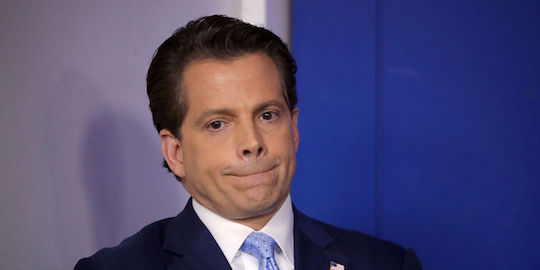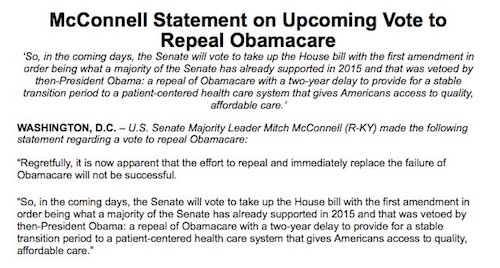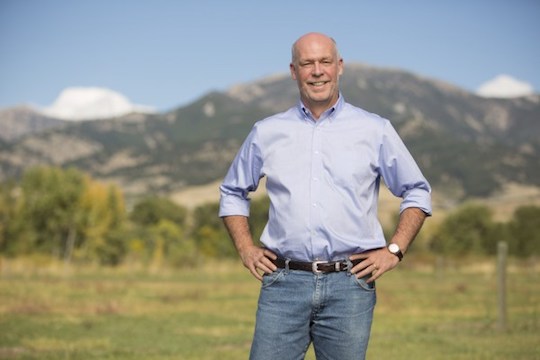The problem with democracy is that people never just shut up and give you what you want. Take American democracy, for example. You would think that after Republicans won control of all three branches of government—at no small cost to their principles, I might add—people would accept their robust agenda of cutting taxes and reversing the flow of time. But no. Everyone has to get their pantaloons in a buncherino over who’s going to die, what sexual orientations deserve legal rights, which countries colluded with the president’s campaign, et cetera. By “everyone,” I mean Republicans. Today is Friday, and even the conspirators are too divided to act. Won’t you vent your frustration with me?
Tag Archives: health care
Steve Daines takes bold stand against methamphetamine
I’m not going to sugarcoat it: American politics have come to a bitter pass, and what one voter holds dear is likely to enrage another. In these fractious times, Senator Steve Daines (R-MT) is doing what he can to bring the country together by standing up for what people still agree on. Last month, he celebrated Flag Day by proposing a constitutional amendment to ban the desecration of Old Glory. That probably cost him some votes in Tehran, but it seemed like a safe move otherwise. He followed it up with an editorial in the Missoulian and other Lee papers last week, in which he spoke out against methamphetamine. Beginning by noting that 95% of participants in his recent telephone town hall agree meth is a problem, he argues for 500 words that meth is, indeed, a problem. He concludes by saying that now is the time to raise awareness.
I suppose that last 5% of awareness is always the hardest. Still, one cannot help but think of other issues Sen. Daines might address, including the massive, secret, and extremely controversial health care bill his caucus is currently trying to ram through the senate. That bill might be why Daines keeps holding telephone town halls instead of regular ones. He hasn’t been back to Montana in a minute, and he lobbied to cancel the August recess. With all the flags-are-good and drugs-are-bad rhetoric coming out of his office right now, he’s starting to look like he might be trying to duck the issue. You can read all about it in this week’s column for the Missoula Independent. We’ll probably be talking about Daines more in the near future, since he introduced that single-payer amendment he doesn’t actually support. Start working on your goblin jokes, and we’ll meet back here tomorrow for Friday links.
Republicare dead in Senate; McConnell humiliated; Priebus returned to puzzle box
Good news for freelancers with trick shoulders: Senate Majority Leader Mitchell “Mitch” McConnell has declared that there will be no vote on the Senate bill to replace Obamacare. This turn of events is a blow to the Republican agenda and, frankly, satisfying comeuppance after listening to them rail againast the Affordable Care Act for the last seven years. It is easy to find fault. It is not so easy to find workable solutions, as McConnell discovered over the past few weeks. He lamented the phenomenon in this statement, which also proposes a terrifying idea:
“Make sure to emphasize that Obamacare is the real failure,” he told his staffers. Also note the appearance of the word “immediately” in the established phrase “repeal and replace,” like a guest star who comes on in the last episode of a long-running drama to take the fall. So we failed to replace Obamacare immediately. We’re still going to replace it. What do you say we just repeal it now and replace it later?
Fortunately, the New York Times reports that plan dead on arrival. The same Republican senators who did not want to take health insurance from millions and give them savings accounts also did not want to take health insurance from millions and give them a timeline. For now, at least, the effort to repeal Obamacare has failed decisively—even though Republicans control both houses of Congress and the executive branch when “Watters’ World” isn’t on.
What does it all mean? I don’t think we can call this a triumph of Democratic opposition. Various operatives, particularly Andy Slavitt, have kept up a steady drumbeat against the Republican plan, but it’s hard to argue they stopped it. McConnell scratched his vote because a handful of Republican senators wouldn’t go along. They were the usual moderate naysayers: Murkowski and Collins, plus Shelly Moore Capito of West Virginia. Their persistent refusal could mean a few things:
- The GOP has drifted so far to the right on issues of social welfare as to lose the moderate members of its caucus.
- The bill under consideration was so particularly bad for women that these three women objected.
- Contemporary Republican politics is vigorous as a critique of liberalism but morbid as an approach to governance.
Guess which explanation I favor. The Republican lifestyle brand as we know it today was forged in opposition to Barack Obama. He was the smooth-talking biracial latte drinker atop the pyramid of liberal power, and they were the Real Americans who said no. Over the last nine years, the outlines of this coalition have become remarkably clear. You can guess whether someone votes Republican by their car, their facial hair, their music and TV habits, their religion—any number of cultural signifiers. This cultural coalition is the one that propelled Donald Trump to the White House, but it is not a coalition of political interests. Once you have to start making concrete policy choices, the Republican coalition falls apart.
How many interests do a West Virginia coal miner and a Chicagoland hedge fund manager have in common? What health care policy goals does Peter Thiel share with Ted Cruz’s dad? All four of these people are likely to agree on the issue of President Obama, but it’s harder to think of what else might bring them together. Right now, the GOP base consists of whites with high school diplomas, the investor/rentier class, evangelical Christians and libertarian idealists. A parliamentary system would put these demographics in at least three different parties. The contemporary Republican coalition has brought them all together, but it is not well suited to governance, because it is not an alignment of natural political interests.
It’s a great way to get a bunch of people all watching the same TV network or voting against the same lady. But it has yet to be fully tested as a machine for solving the country’s problems or even passing substantive legislation. After nine years of tenacious opposition, the need to cooperate may be what finally shakes the modern GOP apart.
Gianforte, John Misty explore gap between the persona and the man
Last week, as Republicans in the House scrambled to pass a health care bill that would repeal and, in a manner of speaking, replace Obamacare, Greg Gianforte had no opinion. When reporters asked how the congressional hopeful would have voted, his spokesman said that he hadn’t read enough of the bill to say. But on the same day, in a conference call with lobbyists, Gianforte said he was “thankful” that the AHCA had passed the House.
That’s not necessarily a sign that the Republican candidate for Montanan’s only seat in the House says one thing in public and another in private. He didn’t say anything in public at all. But it’s troubling that the Gianforte campaign seems to believe it can stonewall the press but owes an answer to party lobbyists. You can read all about this discrepancy in this week’s column for the Missoula Independent. Montana’s special election is only two weeks away, and right now it looks like another contest of negatives.
You can be forgiven if you feel like election season is a nightmare that will never end, though. Perhaps you would prefer lighter fare, like my essay on/review of the new Father John Misty album. I’m a big fan of his last LP, I Love You, Honeybear. I like the FJM persona, a kind of alienated hedonist best described as an exaggerated version of how history remembers Lindsey Buckingham. But on the new album, the mask slips. Its critique of contemporary life is more pointed, and FJM the character seems to have lost a layer of irony in the process. It’s also almost all torch songs, even though the material is pretty dark. The result is a strange combination of easy listening and hard truths, like Jackson Browne meets Nick Cave. Anyway, it’s worth a listen. Whether you’ve liked FJM to this point or are just hearing about him now, it’ll be something new. We’ll be back tomorrow with Friday links!
What doesn’t Donald Trump know?
Combat! blog has been crushed under an avalanche of work today and whimpers from the rubble but faintly. The world doesn’t stop for us to make money, though. Among other people whose work experience consists of pretending to have big, dynamic ideas on whatever subject is presently at hand, history continues apace. Yesterday, on Twitter, President Trump sang the praises of Republicans’ new bill to repeal and replace the Affordable Care Act, which may come to the House for a vote this week. “New healthcare plan is on its way,” he tweeted. “Will have much lower premiums & deductibles while at the same time taking care of pre-existing conditions!” As Robert Pear of the New York Times drily put it, “Which bill Mr. Trump was referring to is not clear.”
He probably means the new version of Trumpcare, which “takes care” of people in the mafia sense of the phrase. One of the concessions that makes this bill more appealing to conservatives in the House Freedom Caucus is a waiver that will allow states to let insurers charge higher premiums to customers with pre-existing conditions. The bill would also remove minimum coverage requirements that are currently part of Obamacare. That takes care of pre-existing conditions only in that it will let insurers charge prohibitively high premiums to cover them. For example, before the Affordable Care Act, I had a $38,000 deductible on my left shoulder because of previous injuries. That was basically the same as not having insurance, except I still paid premiums every month.
As for Trump’s promise of “much lower premiums and deductibles,” that might be true, if anyone cared to find out. Although the last bill Republicans proposed was expected to raise premiums 15% to 20% next year, no such information is known about the current bill. Rep. Chris Collins (R-New York) told the Times that House Republicans are “not planning to seek a new cost-and-impact estimate from the Congressional Budget Office.”
Whatever—the president is just going to say a bunch of stuff anyway. Also this weekend, Trump gave an interview to Salena Zito of the Washington Examiner, in which he compared himself to Andrew Jackson. If you’re thinking that’s kind of an odd choice of role model—given that he was responsible for the deaths of tens of thousands of Indians and wrecked the economy by eliminating the Bank of the United States—you have made a classic error. President Trump is not familiar with American history. I quote the leader of the free world:
People don’t realize, you know, the Civil War, if you think about it, why? People don’t ask that question, but why was there the Civil War? Why could that one not have been worked out?
When Trump says “people don’t realize this,” he means “I just learned this.” Given that he attended high school 50 years ago, you can almost forgive him for saying “people don’t ask” the question that literally every American history class asks. But Jesus Christ, man, he went to the United States Military Academy and then Wharton. He is the president of the United States. Is it too much to expect him to muster a B-level understanding of the most significant event in American history?
Anyway, Trump’s assertion that Jackson “was really angry what he saw with regard to the Civil War; he said, ‘There’s no reason for this'” is not true. Jackson did not say that, and he died 15 years before the war broke out. But who cares, right? The president says some stupid shit that literal schoolchildren know is not true, and it doesn’t matter. None of this matters. Nuke Korea, bankrupt me because I dislocated my shoulder again—the important thing is that a bunch of Jimmy Buffett fans got revenge on college students for not being able to say the n-word anymore. America is great, again.






